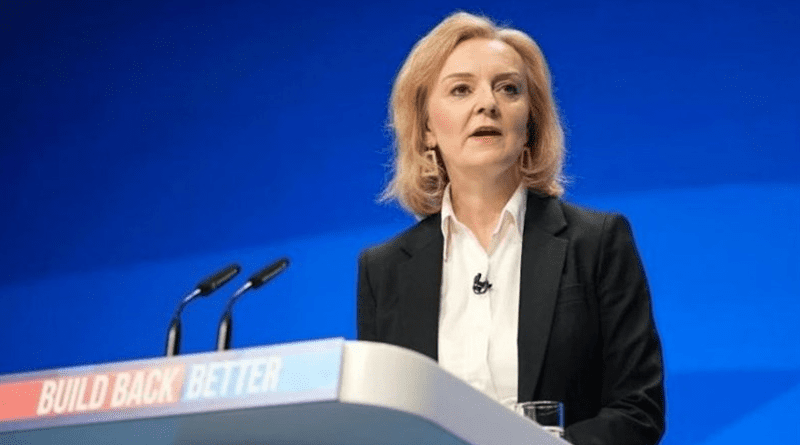Trussonomics At CPAC – OpEd
The silly will make print and leave bursts of digital traces; the idiots will make history, if only in small print. One such figure is the shortest serving UK Prime Minister in living memory, the woeful, joke-packed figure of Liz Truss who lasted a mere 50 disastrous days in office. She was even bettered by a satirical, dressed-up lettuce, filmed in anticipation of her brief, calamitous end.
With such a blotted record, the vacuous, inane Truss felt that her experiences were worthy of recounting to the Conservative Political Action Conference, held at National Harbor, Maryland between February 22 and 24. The gathering, conducted since the 1970s and organised by the American Conservative Union, has become something of a mandatory calendar event for US conservative activists. Those from other countries have also tried to make a splash – keeping Truss company was the demagogic voice of Brexit, Nigel Farage, arguably the most influential British politician not to hold a seat in Parliament.
A self-believer of towering insensibility, Truss oversaw during her flashpoint stint in office mind boggling budgetary decisions. On winning the Tory ballot after the fall of Boris Johnson in 2022, she promised £30 billion in tax cuts via an emergency budget, reversing the rise in National Insurance and a range of energy-price guarantees. That these tax cuts – eventually amounting to £45 billion – were primarily skewed to benefit those at the higher end of the scale did not bother her. “The people at the top of the income distribution pay more tax – so inevitably, when you cut taxes you tend to benefit the people who are more likely to pay tax.” What logic; what reasoning.
With figures of such incompetence, responsibility for failure is always attributed to someone, or something else. In Truss’s case, blame initially lay with fellow comic villain and Chancellor of the Exchequer, Kwasi Kwarteng, with whom she had taken a wrecking ball to the UK economy and the British pound. With Kwarteng, she had previously authored a dotty pamphlet “Britannia Unchained”, warning that Britain should not emulate the economic model of southern European countries, saddled with poor productivity and growth, along with hefty and inefficient public services.
The Economist tasted the irony of it all, seeing Trussonomics as typical of “Britaly”, a country “of political instability, low growth and subordination to bond markets.” A further irony was that the horrified market reaction to Truss suggested her inability to understand the very forces she prefers unleashed over the wickedness of big government and bureaucratic interference. Live by the free market; die by the free market.
What, then, to tell her New World colleagues? At first blush, nothing new. In April 2023, she had already made it across the Atlantic to speak to the Heritage Foundation, where she gave the Margaret Thatcher Freedom Lecture. Monumental failure can undergo changes in transatlantic journey, and the conservative think tank omitted mentioning her spell of prime ministerial lunacy, impressed, instead, by her “long-standing” advocacy “for limited government, low taxes, and freedom, both at home and the UK and around the world.”
The speech was barbed, resentful and absurd, an attempt to channel a politician she resembles in no serious respect, bar certain Little England prejudices, with a smattering of superficially similar economic beliefs. Truss complained of “coordinated resistance from inside the Conservative Party”, “the British corporate establishment”, “the IMF [International Monetary Fund] and even from President Biden.” She grumbled of “a new kind of economic model” that was taking hold in the UK and US, “one that’s focused on redistributionism, on stagnation and on the imbuing of woke culture into our businesses.” Seen from another perspective, this “anti-growth movement”, to use Truss’s daft terminology, had been responsible for her demise.
In her CPAC display, we see an attempt to flatter Donald Trump, drawing from the well of Deep State rhetoric, and various scripted points about insecurity, immigration, terrorism, gender, “wokenomics”, “the power of the left and the power of those bureaucracies.” There are also some head-scratching remarks that lent a cartoonish feel to the mad bat: “you can’t triangulate with terrorists, you can’t compromise with communists, you have to fight for what you believe in.”
The speech is not entirely nonsensical, though Truss misses the significance of any pertinent observations. “What has happened in Britain over the past 30 years is power that used to be in the hands of politicians has been moved to quangos and bureaucrats and lawyers so what you find is a democratically elected government actually unable to enact policies.” While the estrangement of the elected from the elector, aided and abetted by unelected bureaucracies, is hard to deny, Truss is merely implying that an unaccountable dictatorship would surely be far better and representative.
To demonstrate the point, Truss raged against the Office of Budget Responsibility and the Bank of England who “sought to undermine the policies.” Again, the IMF, along with Biden, featured as targets. Again, ignorance of the free market and her ruin by its very dictates, was proudly displayed.
Decoding the Truss basket case of beliefs yields this question: Why were there such impediments to my mad realisation? It was far better, she proposed, to get “a bigger bazooka in order to be able to deliver. And I think we have got to challenge the institutions themselves.” A challenge is a good thing, but best bring a well thought out policy with you when going into battle.

